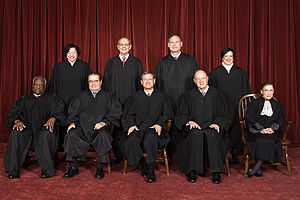May Day was created to commemorate one of the many bloody events in the labor history of the United States: The 1886 Haymarket Massacre in Chicago. The tragedy refers to the aftermath of a bombing that took place at a labor demonstration on Tuesday May 4, 1886, at Haymarket Square in Chicago. A peaceful rally in support of workers who were striking for an eight-hour day was held in the square. An anonymous provocateur threw a dynamite bomb at police after they began to forcibly disperse the supporters who had gathered at the public meeting. The bomb blast and subsequent gunfire resulted in the deaths of seven police officers, four civilians, and the wounding of scores of others. Many, if not all of the deaths, including those of the police, were believed to have been caused by poorly trained police.

A bilingual English-German flier notifying people of a rally in support of striking workers (Chicago, 1886). (Photo credit: Wikipedia)
In 1889, the first congress of the Second Socialist International, meeting in Paris for the centennial of the French Revolution, issued a call for international demonstrations, in 1890, to honor of the fourth anniversary of the beginning of the Chicago protests. May Day was formally recognized as an annual event at the International's second congress in 1891.
In the United States, by contrast, the Central Labor Union and the Knights of Labor, suggested that the celebration of Labor Day for American workers be observed in September as a patriotic alternative to May Day. President Grover Cleveland, ever a supplicant of the business community and fearful that a May 1st commemoration of Labor Day could become an occasion to remind workers of the injustices they suffered, agreed in 1887 to support a Labor Day holiday in September as the Knights had proposed.
Despite President Cleveland's proclamation, American workers continued to observe and to celebrate May1st well into the twentieth century. Parades in New York City, Chicago and in other metropolitan areas, drew millions of union members and supporters of workers' rights. Eighty-one years ago, on May 1, 1933, Dorothy Day, appeared at a rally in Union Square to distribute the first edition of her newspaper and to announce the formation of her organization, the Catholic Worker movement, that to the present is based upon the humble poverty and a radical commitment to social justice inspired by the Gospels and the example of St.Francis of Assisi.

Each year, on the 1st May there is a huge free concert in "San Giovanni" square in Rome, Italy. In 2007 there were approximately 700000 people
Not to be outdone in his patriotic zeal, President Dwight Eisenhower established the first Law Day in 1958. Thereafter, in 1961, Congress issued a joint resolution that designated May 1st as Law Day, which was subsequently codified (U.S. Code, Title 36, Section 113). "Since then every president has issued a Law Day proclamation on May 1 to celebrate the nation's commitment to the rule of law", as the American Bar Association proudly proclaims on its website.
This May Day should remind every working American how much ground employees have lost in the workplace in the past sixty-five years. After the death of Franklin Roosevelt and the election of a Republican Congress in 1946, the right-wing in the United States became resurgent. The first great success of New Deal critics was achieved with the enactment of the Taft-Hartley Act in 1947, which was passed over President Truman's veto. The effect of this legislation was to outlaw "closed shops" and to permit individual states to allow "open shops" - i.e. shops in which elected unions could not require all of the employees to belong to the unions, irrespective of whether the non-union employees also received and enjoyed the benefits of collective bargaining.
As a result of that legislation, corporations began an inevitable migration to the South where welcoming state legislatures hastily enacted "right-to-work" laws. The migration of these manufacturing companies away from the unionized urban centers of the Midwest and North left hundreds of mill towns impoverished and desolate, and the union movement was effectively eviscerated. It took only a few more decades, however, for the owners of corporations to discover that, once they had escaped from the threat of unionization, they could escape almost all government regulation by moving their business and manufacturing operations out of the United States to Third World countries.
Even among the few unionized workers still employed in manufacturing, a two-tier pay system has been imposed by management to which unions were forced to acquiesce because of downward economic pressures: younger workers now make substantially less per hour than more senior employees who perform the same work. The effect of this two-tier system denies younger workers upward mobility and divides workers based solely upon dates of hire: "The changing job market is undercutting entry-level wages for those who do not go to college. 'In the 1960s and 1970s, you saw high school graduates getting good jobs at Ford and AT&T, jobs that in inflation-adjusted terms were paying $20 or $25 in today's wages," said Sheldon Danziger, a professor of public policy at the University of Michigan. "Nowadays most kids with just high school degrees will work in service-sector jobs for $10 or less..."
According to the U.S Department of Labor ["Union Member Summary," January 22, 2010], as of 2010, only 12.3 per cent of employed wage and salary workers were union members. Not surprisingly, many of the same non-union employees do not seem to understand that their ability to influence working conditions and wages, as solitary individuals who lacked comparable bargaining power with managers and owners of business, are virtually nil. Apparently, however, the myth of the autonomous, self-made individual who can receive recognition, remuneration and advancement solely by dint of one's own hard work continues to resonate in the workplace to the present, notwithstanding all of the evidence to the contrary.
The effect of this continuing economic trend has been to show, once again, that the market economy, and the ideology upon which it is based, produces results quite different from its theory: In an world of unrestrained competition, only the few, the wealthier, the more powerful, the more resourceful, the better educated, the more mobile, will be able to maximize their opportunities; everyone else gets left behind.
With the demise of the labor movement, the American workplace continues to be governed by the nineteenth century doctrine of employment-at-will, which further circumscribes the ability of most Americans to protect their livelihoods or to improve their conditions of work. The legal fiction of at-will employment essentially posits an equality of bargaining power between individual employers and employees: Each is free to accept or reject employment, resign or be fired without cause or restriction.
Since employers in "union-free" environments are legally permitted to unilaterally impose, almost without restriction, whatever conditions of work they require as to hours, compensation, and often restrictions on re-employment after discharge in the form of non-competition agreements, the relationship is again one of inequality in which the employees are burdened and the employers benefited. In response to this conundrum, the operative political philosophy of this country, which is based upon John Locke's model of politics, can provide no guidance or remedy whatsoever, since his politics envision nothing beyond solitary actors whose property must be protected as well as their rights of acquisition.
The labor laws of the United States today are among the most restrictive and onerous in the developed world. Labor laws that are rigged in favor of the employers and the legal fiction of at-will employment need to be at the top of any agenda to reform the American economy and restore a vibrant middle class. Since corporations and employers are not required to any show any loyalty to their employees, employees need to demand that our labor laws and our tax policies protect the rights of workers and the middle class, and place obstacles in the way of corporations, particularly multi-national corporations, from doing further damage to the American economy.
The philosopher George Santayana reminds that those who forget the past are condemned to repeat it. Reclaiming the American Dream must begin with reclaiming our collective history. Remembering the meaning of May 1st and expressing our solidarity with one another and with workers everywhere is an essential first step in that process.




